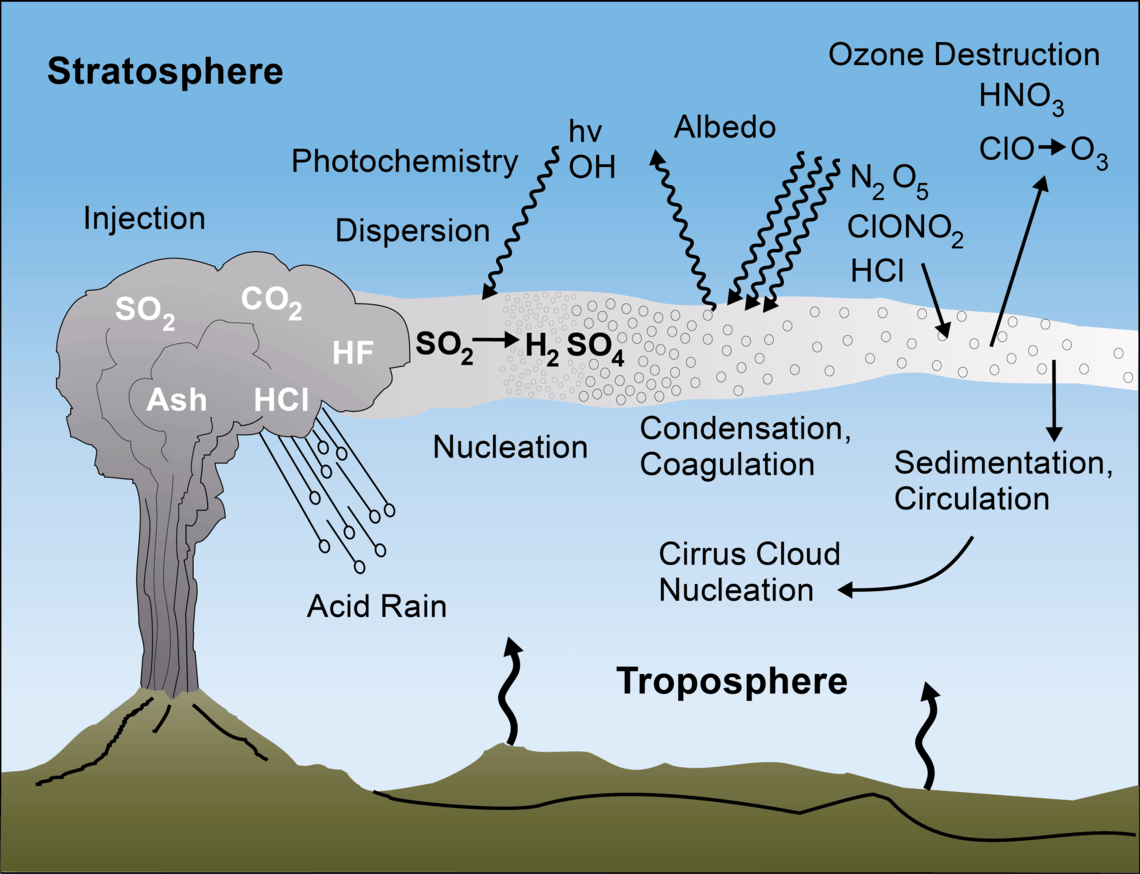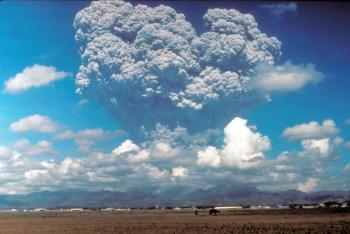BUILDING RISK KNOWLEDGE
WHY THE FOUNDATION WAS BORN? >
WHY THE FOUNDATION WAS BORN? >
DISASTERS ARE NOT NATURAL, they are socially built, due to lack of preparation, prevention, mitigation work, education and monitoring. They are natural risks or hazards that impact vulnerable societies. Knowledge help reducing social and structural vulnerability in order to have more resilient societies!
Volcanoes can impact climate change. During major explosive eruptions huge amounts of volcanic gas, aerosol droplets, and ash are injected into the stratosphere. Injected ash falls rapidly from the stratosphere — most of it is removed within several days to weeks — and has little impact on climate change. But volcanic gases like sulfur dioxide can cause global cooling, while volcanic carbon dioxide, a greenhouse gas, has the potential to promote global warming.
The most significant climate impacts from volcanic injections into the stratosphere come from the conversion of sulfur dioxide to sulfuric acid, which condenses rapidly in the stratosphere to form fine sulfate aerosols. The aerosols increase the reflection of radiation from the Sun back into space, cooling the Earth’s lower atmosphere or troposphere.

Volcanic gases react with the atmosphere in various ways; the conversion of sulfur dioxide (SO2) to sulfuric acid (H2SO4has the most significant impact on climate.
Several eruptions during the past century have caused a decline in the average temperature at the Earth’s surface of up to half a degree (Fahrenheit scale) for periods of one to three years. The climactic eruption of Mount Pinatubo on June 15, 1991, was one of the largest eruptions of the twentieth century and injected a 20-million ton (metric scale) sulfur dioxide cloud into the stratosphere at an altitude of more than 20 miles. The Pinatubo cloud was the largest sulfur dioxide cloud ever observed in the stratosphere since the beginning of such observations by satellites in 1978. It caused what is believed to be the largest aerosol disturbance of the stratosphere in the twentieth century, though probably smaller than the disturbances from eruptions of Krakatau in 1883 and Tambora in 1815. Consequently, it was a standout in its climate impact and cooled the Earth’s surface for three years following the eruption, by as much as 1.3 degrees F at the height of the impact.
The large 1783-1784 Laki fissure eruption in Iceland released a staggering amount more sulfur dioxide than Pinatubo (approximately 120-million ton vs. 20). Although the two eruptions were significantly different in length and style, the added atmospheric SO2 caused regional cooling of Europe and North America by similar amounts for similar periods of time.
Carbon dioxide (CO2) is a greenhouse gas and is the primary gas blamed for climate change. While sulfur dioxide released in contemporary volcanic eruptions has occasionally caused detectable global cooling of the lower atmosphere, the carbon dioxide released in contemporary volcanic eruptions has never caused detectable global warming of the atmosphere. In 2010, human activities were responsible for a projected 35 billion metric tons (gigatons) of CO2 emissions. All studies to date of global volcanic carbon dioxide emissions indicate that present-day subaerial and submarine volcanoes release less than a percent of the carbon dioxide released currently by human activities. While it has been proposed that intense volcanic release of carbon dioxide in the deep geologic past did cause global warming, and possibly some mass extinctions, this is a topic of scientific debate at present.

The June 12, 1991 eruption column from Mount Pinatubo taken from the east side of Clark Air Base.
Published scientific estimates of the global CO2 emission rate for all degassing subaerial (on land) and submarine volcanoes lie in a range from 0.13 gigaton to 0.44 gigaton per year. The 35-gigaton projected anthropogenic CO2 emission for 2010 is about 80 to 270 times larger than the respective maximum and minimum annual global volcanic CO2 emission estimates.
There is no question that very large volcanic eruptions can inject significant amounts of carbon dioxide into the atmosphere. The 1980 eruption of Mount St. Helens vented approximately 10 million tons of CO2 into the atmosphere in only 9 hours. However, it currently takes humanity only 2.5 hours to put out the same amount. While large explosive eruptions like this are rare and only occur globally every 10 years or so, humanity’s emissions are ceaseless and increasing every year.
There continues to be efforts to reduce uncertainties and improve estimates of present-day global volcanic CO2 emissions, but there is little doubt among volcanic gas scientists that the anthropogenic CO2 emissions dwarf global volcanic CO2 emissions.
For additional information about this subject, please read the American Geophysical Union’s Eos article “Volcanic Versus Anthropogenic Carbon Dioxide” written by USGS scientist Terrence M. Gerlach.
| Yearly CO2 emitters | Billion metric tons per year (Gt/y) |
| Global volcanic emissions (highest preferred estimate) | 0.26 |
| Anthropogenic CO2 from fuel combustion 2015+ | 32.3 |
| Worldwide Road Transportation 2015+ | 5.8 |
| Approximately 24 1000-megawatt coal-fired power stations * | 0.22 |
| Argentina 2015+ | 0.19 |
| Poland 2015+ | 0.28 |
| United States 2015+ | 4.99 |
| CO2 emission events | |
| Mount St. Helens, 18 May 1980 | 0.01 Gt |
| Mount Pinatubo, 15 June 1991 | 0.05 Gt |
| Number of Pinatubo-equivalent eruptions equal to 2010 global anthropogenic CO2 | 700 |
| Number of Mount St. Helens-equivalent eruptions equal to 2010 global anthropogenic CO2 | 3500 |
| 2010 global anthropogenic CO2 multiplier (ACM)** | 135 |
| 1950 ACM | 38 |
| 1900 ACM | 18 |
| Number of days for anthropogenic CO2 to equal a year’s worth of global volcanism | 2.7 |
* Equal to 2% of the world’s coal-fired electricity-generating capacity.
**Ratio of annual anthropogenic CO2 (approximately 35 Gt) to maximum preferred estimate for annual volcanic CO2.
+2015 data from IEA CO2 Emissions From Fuel Combustion 2017 edition.
VOLCANO ACTIVE FOUNDATION RESPONSABILITY
nº 2195 authorised by the Madrid's Minister of Justice
NIF G67314625
SF Abocados Francesc Macia 7 pl17
08029 Barcelona, Spain
We may request cookies to be set on your device. We use cookies to let us know when you visit our websites, how you interact with us, to enrich your user experience, and to customize your relationship with our website.
Click on the different category headings to find out more. You can also change some of your preferences. Note that blocking some types of cookies may impact your experience on our websites and the services we are able to offer.
These cookies are strictly necessary to provide you with services available through our website and to use some of its features.
Because these cookies are strictly necessary to deliver the website, refusing them will have impact how our site functions. You always can block or delete cookies by changing your browser settings and force blocking all cookies on this website. But this will always prompt you to accept/refuse cookies when revisiting our site.
We fully respect if you want to refuse cookies but to avoid asking you again and again kindly allow us to store a cookie for that. You are free to opt out any time or opt in for other cookies to get a better experience. If you refuse cookies we will remove all set cookies in our domain.
We provide you with a list of stored cookies on your computer in our domain so you can check what we stored. Due to security reasons we are not able to show or modify cookies from other domains. You can check these in your browser security settings.
These cookies collect information that is used either in aggregate form to help us understand how our website is being used or how effective our marketing campaigns are, or to help us customize our website and application for you in order to enhance your experience.
If you do not want that we track your visit to our site you can disable tracking in your browser here:
We also use different external services like Google Webfonts, Google Maps, and external Video providers. Since these providers may collect personal data like your IP address we allow you to block them here. Please be aware that this might heavily reduce the functionality and appearance of our site. Changes will take effect once you reload the page.
Google Webfont Settings:
Google Map Settings:
Google reCaptcha Settings:
Vimeo and Youtube video embeds:
The following cookies are also needed - You can choose if you want to allow them:
You can read about our cookies and privacy settings in detail on our Privacy Policy Page.
PRIVACY POLICY